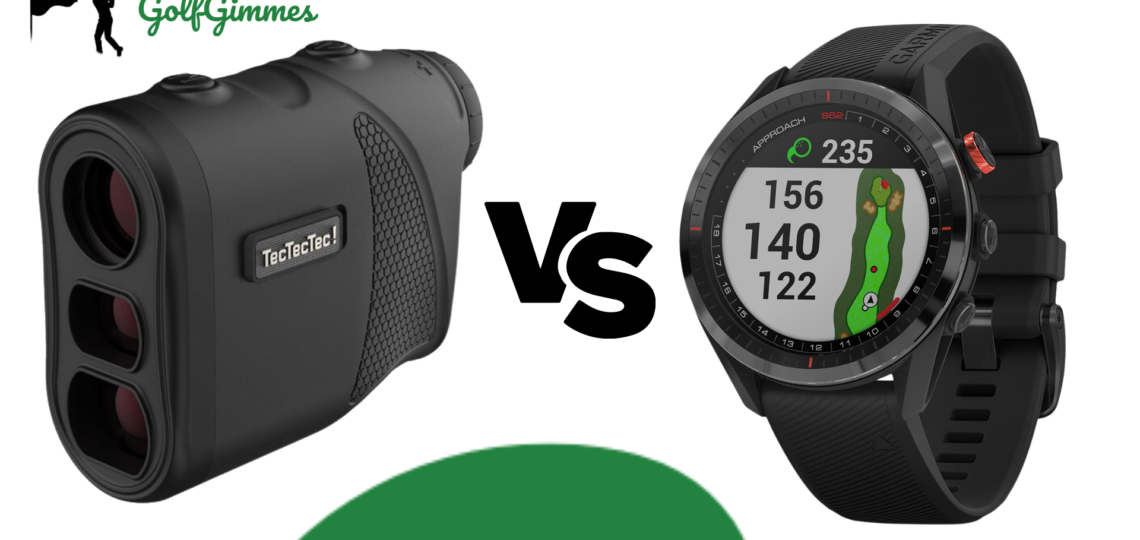
GPS Watches vs. Range Finders – Which One Is Right for You?

Introduction:
In the modern era of golf, technology has become an indispensable ally for players seeking to improve their game and lower their scores. Among the array of gadgets and tools available, GPS watches and range finders stand out as popular choices for aiding in course navigation and shot selection. In this comprehensive blog post, we’ll explore the pros and cons of GPS watches and range finders, helping you decide which option best suits your needs on the fairways.
**GPS Watches: The Pros and Cons**
*Pros:*
1. **Course Mapping:** GPS watches provide detailed course maps, displaying accurate distances to hazards, bunkers, and greens. This information helps golfers plan their shots more strategically and avoid potential trouble spots.
2. **Convenience:** With a GPS watch strapped to your wrist, you have instant access to course data without the need to fumble with additional devices or apps. The convenience of having yardage information readily available enhances pace of play and simplifies decision-making on the course.
3. **Multi-Functionality:** Many GPS watches offer additional features beyond basic distance measurements, such as score tracking, shot tracking, and fitness monitoring. These added functionalities make GPS watches versatile tools for both on-course performance and overall wellness.
*Cons:*
1. **Limited Accuracy:** While GPS watches provide valuable distance estimates, their accuracy may vary depending on factors such as satellite signal strength and course mapping quality. In some cases, GPS measurements may be less precise than those obtained with a range finder.
2. **Dependency on Technology:** GPS watches rely on satellite signals and electronic components, making them susceptible to battery life issues, connectivity issues, and software glitches. Reliance on technology introduces a level of vulnerability that may disrupt your round if not properly managed.
3. **Cost:** High-quality GPS watches can be relatively expensive compared to basic range finders, especially models with advanced features and subscription-based services. For budget-conscious golfers, the upfront cost of a GPS watch may be a deterrent.
**Range Finders: The Pros and Cons**
*Pros:*
1. **Pinpoint Accuracy:** Range finders use laser technology to precisely measure distances to specific targets, such as flags or hazards. This level of accuracy allows golfers to dial in their yardages with confidence, leading to more precise shot execution.
2. **Ease of Use:** Operating a range finder is straightforward – simply aim, press a button, and receive instant distance readings. The intuitive nature of range finders makes them accessible to golfers of all skill levels, with minimal learning curve required.
3. **Independence from Satellites:** Unlike GPS watches, range finders do not rely on satellite signals for distance calculations. This independence from external factors enhances reliability and ensures consistent performance regardless of course conditions.
*Cons:*
1. **Limited Course Mapping:** Range finders provide distance measurements to specific targets but lack the comprehensive course mapping capabilities of GPS watches. Without detailed course data, golfers may struggle to assess overall hole layouts and strategic options.
2. **Line-of-Sight Requirement:** Range finders require a clear line of sight to the target in order to obtain accurate readings. Obstructed views, such as trees or elevation changes, may hinder the effectiveness of a range finder and require alternative yardage estimation methods.
3. **Additional Setup Time:** While range finders are relatively easy to use, they do require a brief setup process before each shot. This extra step of aiming and focusing may slow down pace of play compared to the instantaneous data retrieval of GPS watches.
**Which One Should You Buy?**
Ultimately, the decision between a GPS watch and a range finder comes down to personal preference, playing style, and budget considerations. Here are some factors to consider when making your choice:
1. **Course Preference:** If you frequently play unfamiliar courses or prefer access to detailed hole maps and hazard information, a GPS watch may be the better option.
2. **Accuracy Requirements:** If pinpoint accuracy is your top priority and you prioritize precise distance measurements to specific targets, a range finder may be the ideal choice.
3. **Budget:** Consider your budget constraints and the features that matter most to you. While GPS watches tend to be more expensive upfront, they offer a wider range of functionalities. Range finders may be a more cost-effective option for golfers seeking basic distance measurements without additional frills.
4. **Convenience vs. Precision:** GPS watches offer convenience and comprehensive course data, while range finders provide precision and simplicity of operation. Decide which trade-offs you are willing to make based on your preferences and priorities on the course.
Conclusion:
Both GPS watches and range finders offer valuable tools for enhancing your golfing experience and improving your performance on the course. By weighing the pros and cons of each option and considering your individual needs and preferences, you can make an informed decision that aligns with your goals and playing style. Whether you opt for the convenience of a GPS watch or the precision of a range finder, incorporating technology into your game can help you navigate the fairways with confidence and elevate your overall
